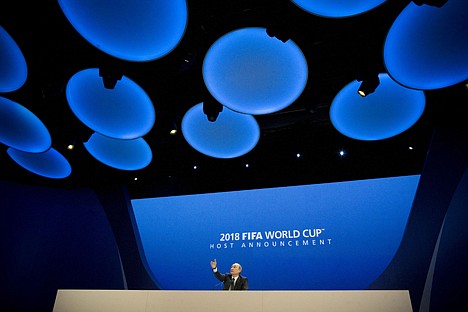Russia, Qatar score big
ZURICH (AP) - Picture football fans partying where tanks and missiles paraded on Red Square in the Cold War's darkest days. Imagine high-tech air-conditioned stadiums chilled so players and spectators don't keel over in the sweltering desert heat of the Middle East.
For all the allegations of corruption and rigged voting that have been leveled lately against FIFA, the much-maligned governing body of football certainly has a taste for adventure.
In taking the World Cup to the uncharted lands of Russia in 2018 and tiny but oil-wealthy Qatar in 2022, FIFA - like the International Olympic Committee - is leading the charge for the argument that sports can reshape history and influence the destinies and the way people and nations are seen by the rest of the world.
FIFA could have played it safe by going to the sport's motherland of England or to the ready-built stadiums of the United States. Both promised minimal worry and lots of cash. But the desire of FIFA's all-powerful, 74-year-old president, Sepp Blatter, to carry football and its considerable influence to promising and largely untapped markets won the day.
"We go to new lands," said Blatter, who next June will seek another four-year presidential term.
In doing so, FIFA is marching in lockstep with the Olympics, which went to China for the first time in 2008, celebrating the U-turn over one generation from Maoism to frontier capitalism in the world's most populous country. The IOC is now preparing for the first Olympics in South America, in Rio de Janeiro in 2016, rewarding Brazil's emergence as a major power. FIFA, meanwhile, is still basking in the praise it won for taking the World Cup to Africa for the first time in June, where vuvuzela-blowing black and white South Africans demonstrated how far they have moved on from apartheid.
Russia and Qatar are not without risk for FIFA - although with reserves of $1 billion and the sport wealthier and more popular than ever, it can afford a gamble or two.
In awarding two World Cups at the same time, FIFA aims to give itself more stable and long-term revenues from the tournament that underpins its wealth. It also means Blatter's influence will outlive his presidency. But it also leaves him and the 21 other VIPs on FIFA's executive committee open to suspicions that bidding nations might have colluded to secure their votes. The committee members voted behind closed doors and were furiously lobbied by statesmen, sheiks, sports stars and Britain's Prince William, who tossed in a joke about his upcoming wedding.

